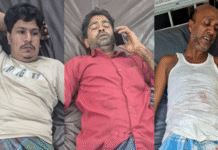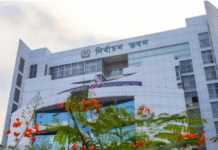NGO holds hopes for challenged people

Physically challenged Russel works on a computer at his CDD office. He also imparts capacity building training, oversees field work and library management, and accompanies foreign visitors on tours. Photo: Kazi Tahsin Agaz Apurbo
Stepping into the offices of the Centre for Disability in Development (CDD), one will definitely get a whiff or two of positive energy from the people around. While a man, visually impaired, takes you on a tour of the office, a woman in a wheelchair shows you how their jobs are done. With a building designed especially for the disabled, CDD manages to bring hope and spirit to many lives.
Russel works at the Centre for Disability in Development (CDD). He does not have arms; and he types with his feet. “I have a lot of responsibilities here at the CDD,” he says. “I do capacity building training for groups, go to the field to oversee the work,” he says. In addition, Russel is also busy with library management and composing reports in the computer section. From time to time, he also accompanies visitors from abroad on field tours. “CDD has hired me on the basis of my merit,” asserts Russel. “Nobody in the organisation has ever made me feel different or handicapped.”
Like Russel, many others who are disabled are now getting the opportunity to work and earn on their own. Back in 2002, the CDD had conducted a study on employment for the disabled. After getting disappointing results, no follow-up studies were done. Eleven years later, in 2013, the studies commenced again and they have now reached a peak where the CDD is disseminating awareness over the lack of employment amongst the disabled. Sadaf Noori Chowdhury, Development Manager at the National Resource Centre for the Deaf and Blind, CDD, says, “There was a 10 percent quota set by the government for the employment of the disabled. Unfortunately, not even 2 percent of the quota is being met.” Through the study, the CDD creates awareness amongst organisations and recommends that they employ the disabled.
The CDD has already began providing artificial limbs to victims of the Rana Plaza tragedy, which occurred earlier this year when the Rana Plaza, housing garment factories, collapsed, leaving more than a 1,000 people dead, 2,500 injured and many more reportedly missing. In addition, the CDD is also providing employment opportunities to the Rana Plaza victims. One victim has already started working in the factory where artificial limbs are made. “It is truly inspiring to see a disabled man make artificial limbs for others just like him,” says Sadaf. Through initiatives like this, the victims of disability spot a glimmer of hope that will enable them to lead normal, healthy lives.
Are you a change maker or a witness to positive change? Send us your stories to positivebangladesh@thedailystar.net and take Bangladesh one step forward.
Source: The Daily Star









